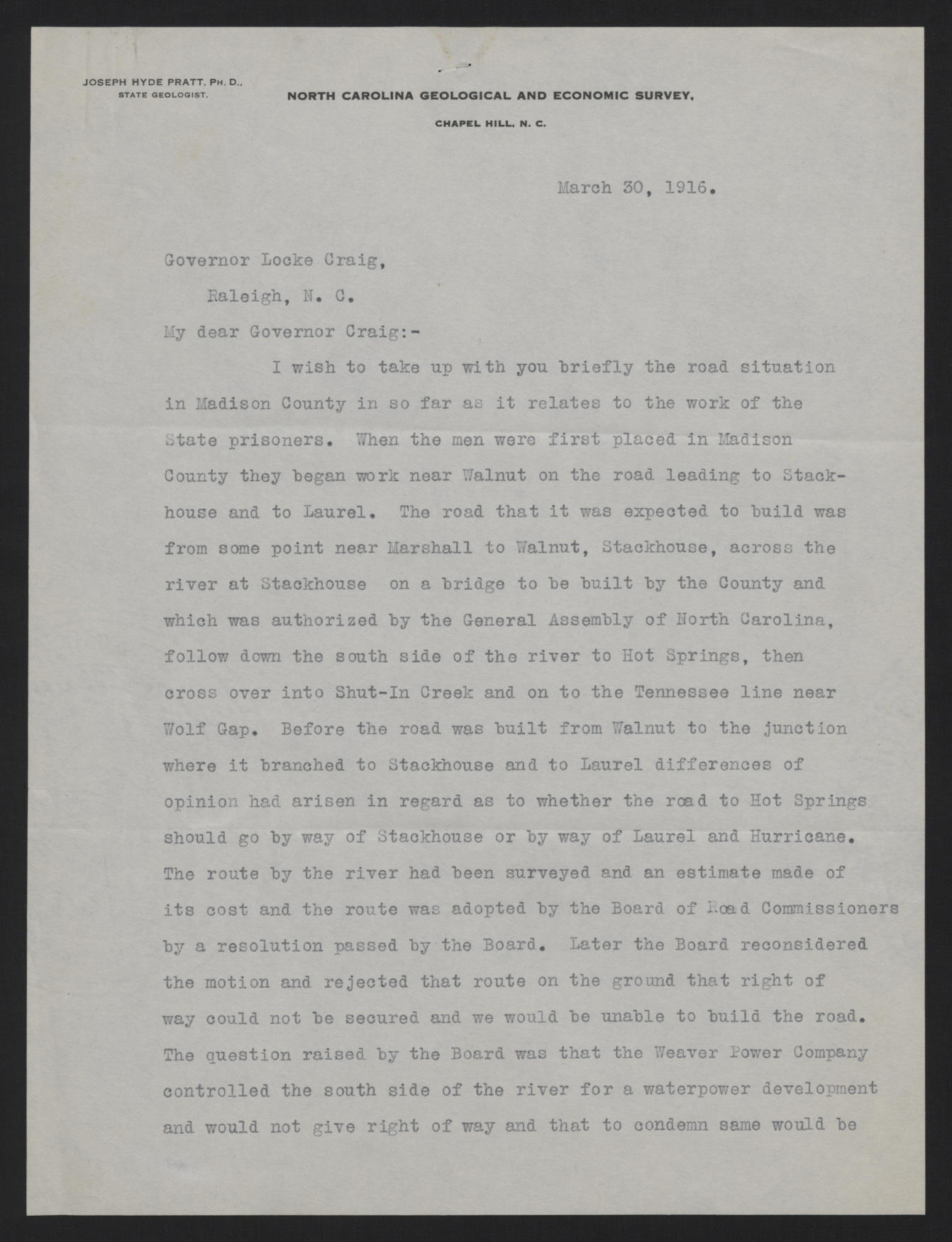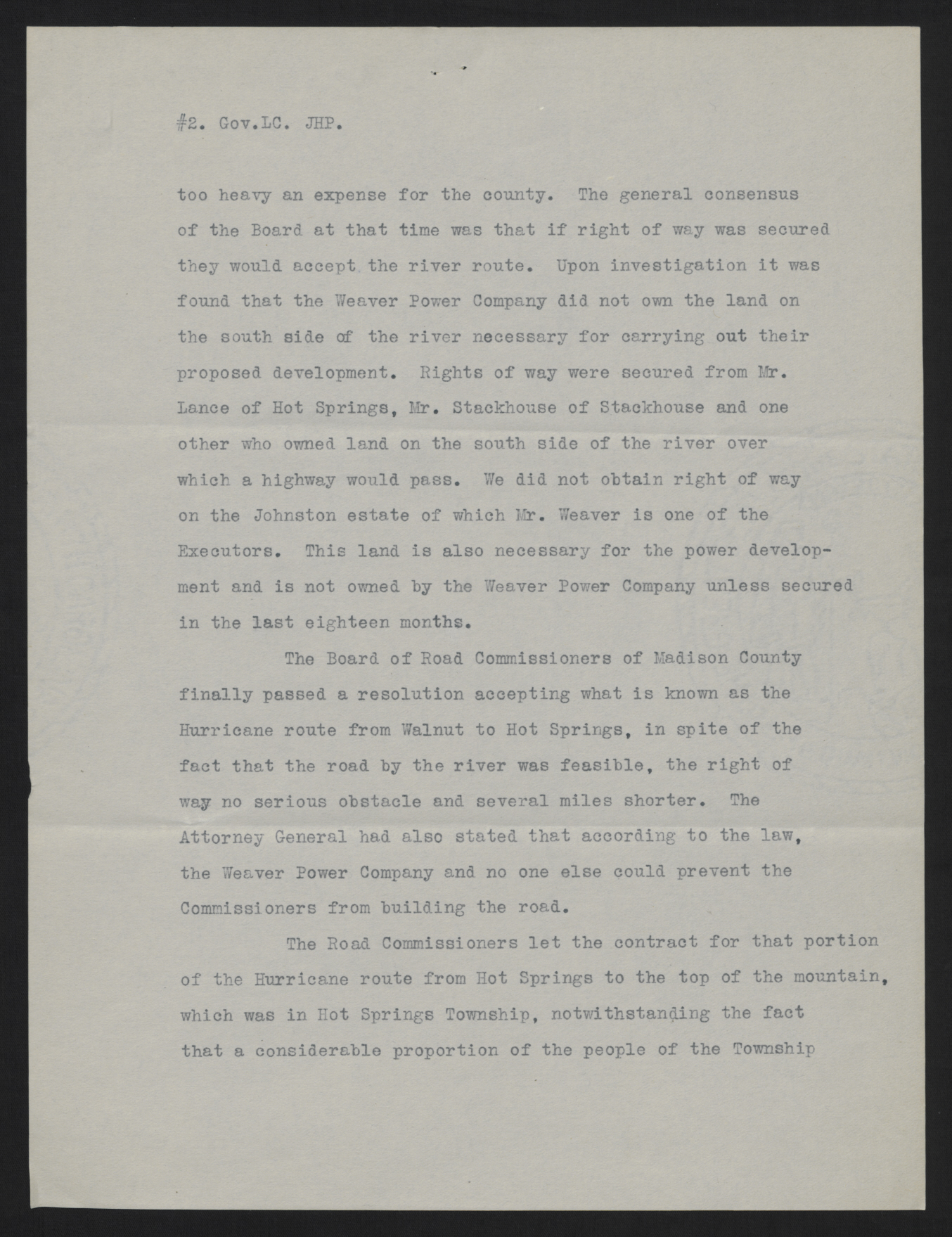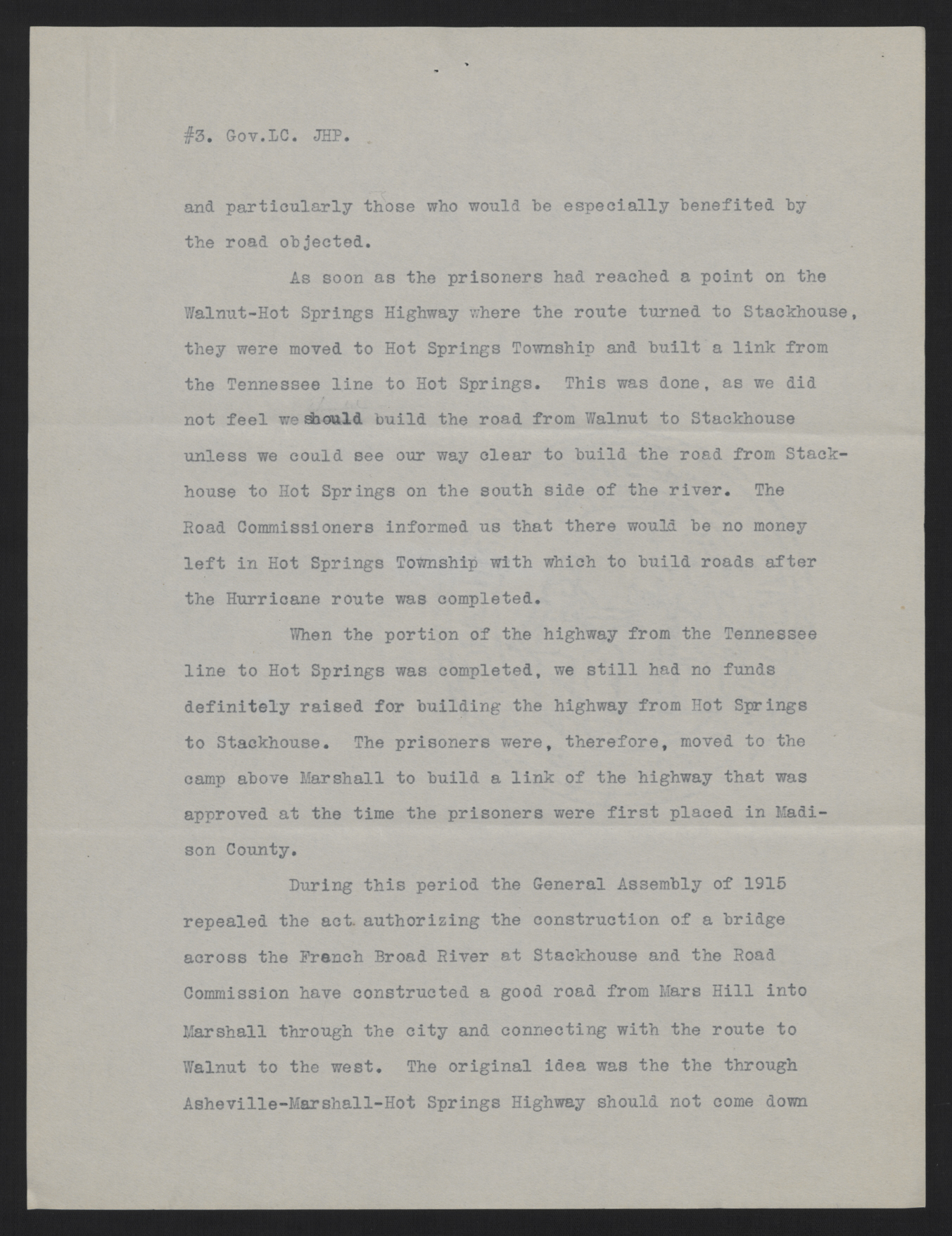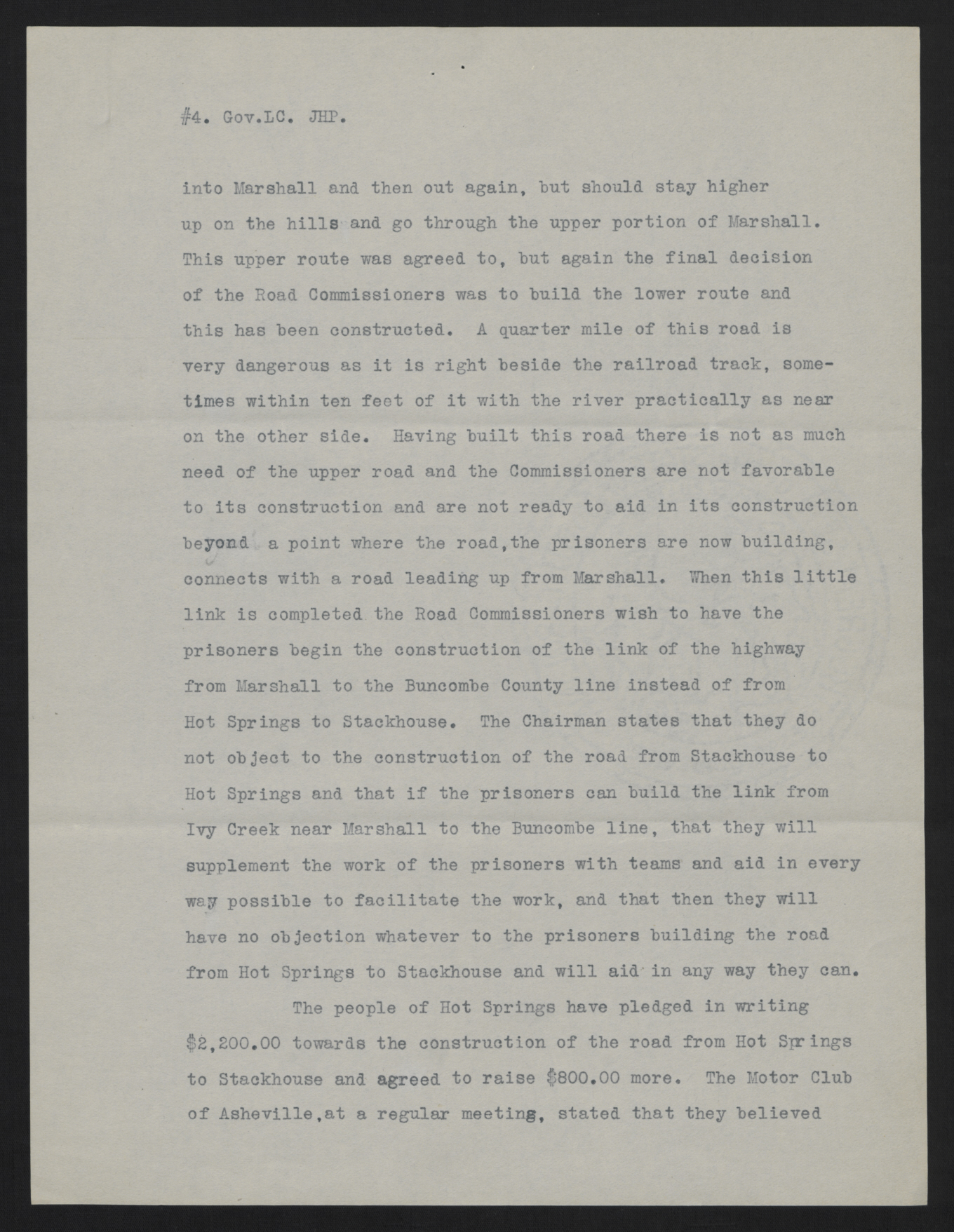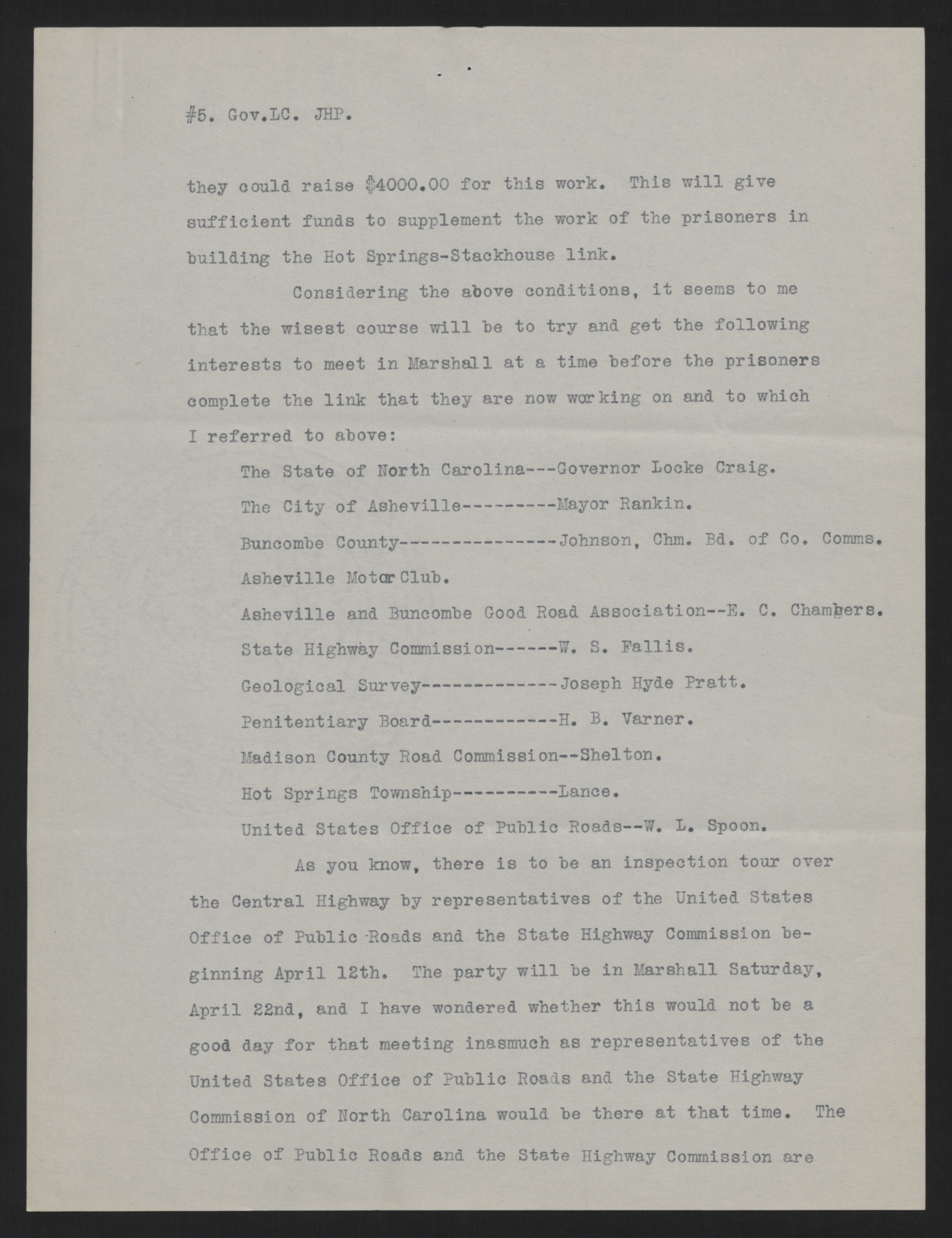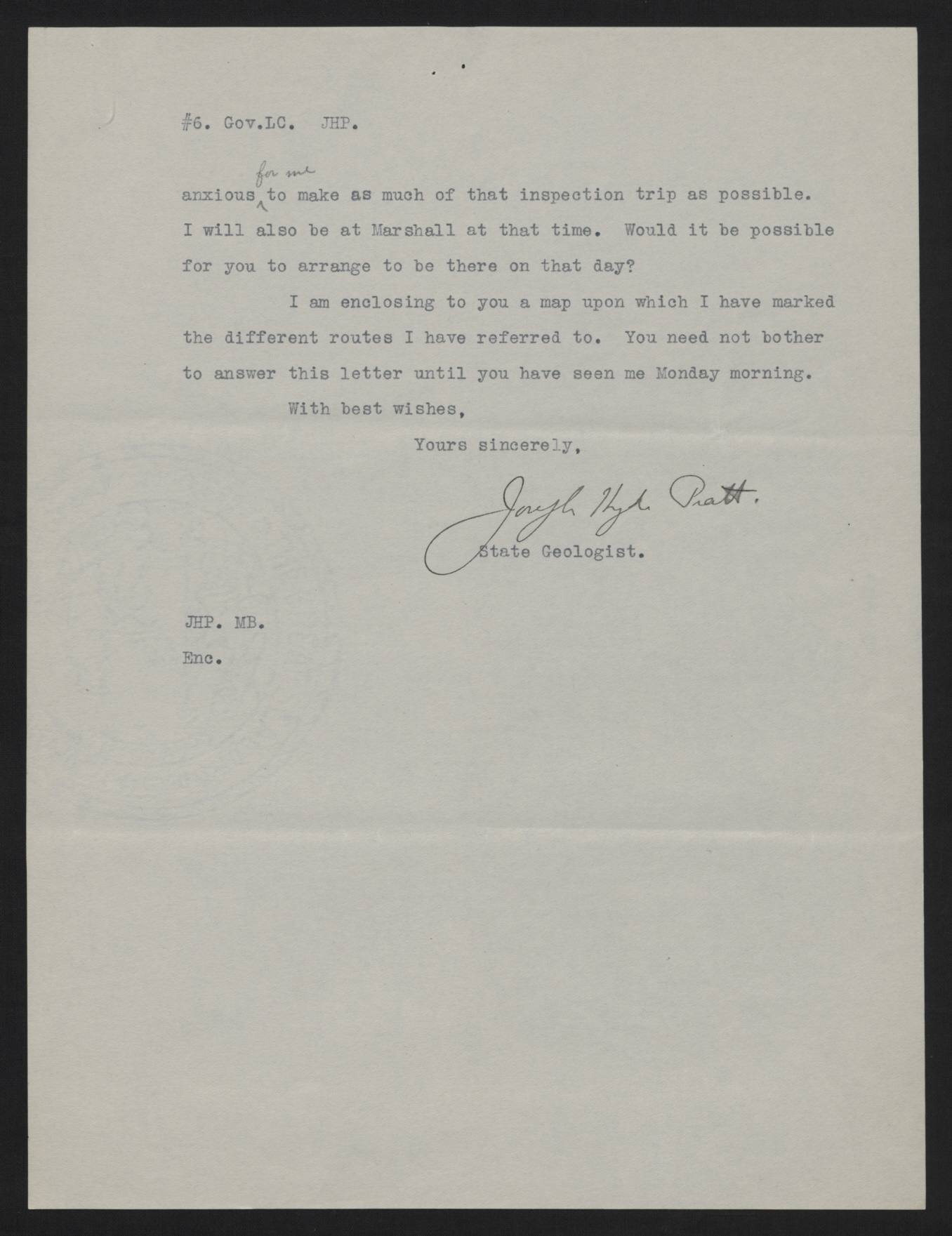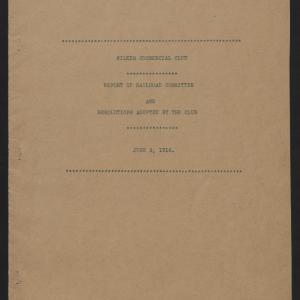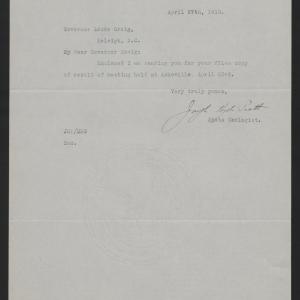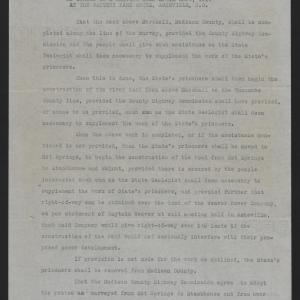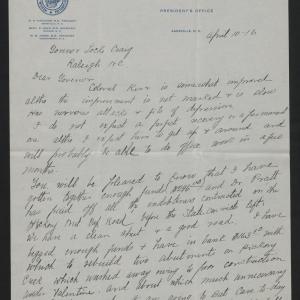NORTH CAROLINA GEOLOGICAL AND ECONOMIC SURVEY.
CHAPEL HILL, N.C.
March 30, 1916.
Governor Locke Craig,
Raleigh, N.C.
My dear Governor Craig:-
I wish to take up with you briefly the road situation in Madison County in so far as it relates to the work of the State prisoners. When the men were first placed in Madison County they began work near Walnut on the road leading to Stackhouse and to Laurel. The road that it was expected to build was from some point near Marshall to Walnut, Stackhouse, across the river at Stackhouse on a bridge to be built by the County and which was authorized by the General Assembly of North Carolina, follow down the south side of the river to Hot Springs, then cross over into Shut-In Creek and on to the Tennessee line near Wolf Gap. Before the road was built from Walnut to the junction where it branched to Stackhouse and to Laurel differences of opinion had arisen in regard as to whether the road to Hot Springs should go by way of Stackhouse or by way of Laurel and Hurricane. The route by the river had been surveyed and an estimate made of its cost and the route was adopted by the Board of Road Commissioners by a resolution passed by the Board. Later the Board reconsidered the motion and rejected that route on the ground that right of way could not be secured and we would be unable to build the road. The question raised by the Board was that the Weaver Power Company controlled the south side of the river for a waterpower development and would not give right of way and that to condemn same would be too heavy an expense for the county. The general consensus of the Board at that time was that if right of way was secured they would accept the river route. Upon investigation it was found that the Weaver Power Company did not own the land on the south side of the river necessary for carrying out their proposed development. Rights of way were secured from Mr. Lance of Hot Springs, Mr. Stackhouse of Stackhouse and one other who owned land on the south side of the river over which a highway would pass. We did not obtain right of way on the Johnston estate of which Mr. Weaver is one of the Executors. This land is also necessary for the power development and is not owned by the Weaver Power Company unless secured in the last eighteen months.
The Board of Road Commissioners of Madison County finally passed a resolution accepting what is known as the Hurricane route from Walnut to Hot Springs, in spite of the fact that the road by the river was feasible, the right of way no serious obstacle and several miles shorter. The Attorney General had also stated that according to the law, the Weaver Power Company and no one else could prevent the Commissioners from building the road.
The Road Commissioners let the contract for that portion of the Hurricane route from Hot Springs to the top of the mountain, which was in Hot Springs Township, notwithstanding the fact that a considerable proportion of the people of the Township and particularly those who would be especially benefited by the road objected.
As soon as the prisoners had reached a point on the Walnut-Hot Springs Highway where the route turned to Stackhouse, they were moved to Hot Springs Township and built a link from the Tennessee line to Hot Springs. This was done, as we did not feel we should build the road from Walnut to Stackhouse unless we could see our way clear to build the road from Stackhouse to Hot Springs on the south side of the river. The Road Commissioners informed us that there would be no money left in Hot Springs Township with which to build roads after the Hurricane route was completed.
When the portion of the highway from the Tennessee line to Hot Springs was completed, we still had no funds definitely raised for building the highway from Hot Springs to Stackhouse. The prisoners were, therefore, moved to the camp above Marshall to build a link of the highway that was approved at the time the prisoners were first placed in Madison County.
During this period the General Assembly of 1915 repealed the act authorizing the construction of a bridge across the French Broad River at Stackhouse and the Road Commission have constructed a good road from Mars Hill into Marshall through the city and connecting with the route to Walnut to the west. The original idea was the the through Asheville-Marshall-Hot Springs Highway should not come down into Marshall and then out again, but should stay higher up on the hills and go through the upper portion of Marshall. This upper route was agreed to, but again the final decision of the Road Commissioners was to build the lower route and this has been constructed. A quarter mile of this road is very dangerous as it is right beside the railroad track, sometimes within ten feet of it with the river practically as near on the other side. Having built this road there is not as much need of the upper road and the Commissioners are not favorable to its construction and are not ready to aid in its construction beyond a point where the road, the prisoners are now building, connects with a road leading up from Marshall. When this little link is completed the Road Commissioners wish to have the prisoners begin the construction of the link of the highway from Marshall to the Buncombe County line instead of from Hot Springs to Stackhouse. The Chairman states that they do not object to the construction of the road from Stackhouse to Hot Springs and that if the prisoners can build the link from Ivy Creek near Marshall to the Buncombe line, that they will supplement the work of the prisoners with teams and aid in every way possible to facilitate the work, and that then they will have no objection whatever to the prisoners building the road from Hot Springs to Stackhouse and will aid in any way they can.
The people of Hot Springs have pledged in writing $2,200.00 towards the construction of the road from Hot Springs to Stackhouse and agreed to raise $800.00 more. The Motor Club of Asheville, at a regular meeting, stated that they believed they could raise $4000.00 for this work. This will give sufficient funds to supplement the work of the prisoners in building the Hot Springs-Stackhouse link.
Considering the above conditions, it seems to me that the wisest course will be to try and get the following interests to meet in Marshall at a time before the prisoners complete the link that they are now working on and to which I referred to above:
The State of North Carolina—Governor Locke Craig.
The City of Asheville—Mayor Rankin.
Buncombe County—Johnson, Chm. Bd. of Co. Comms.
Asheville Motor Club.
Asheville and Buncombe Good Road Association—E. C. Chambers.
State Highway Commission—W. S. Fallis.
Geological Survey—Joseph Hyde Pratt.
Penitentiary Board—H. B. Varner.
Madison County Road Commission—Shelton.
Hot Springs Township—Lance.
United States Office of Public Roads—W. L. Spoon.
As you know, there is to be an inspection tour over the Central Highway by representatives of the United States Office of Public Roads and the State Highway Commission beginning April 12th. The party will be in Marshall Saturday, April 22nd, and I have wondered whether this would not be a good day for that meeting inasmuch as representatives of the United States Office of Public Roads and the State Highway Commission of North Carolina would be there at that time. The Office of Public Roads and the State Highway Commission are anxious for me to make as much of that inspection trip as possible. I will also be at Marshall at that time. Would it be possible for you to arrange to be there on that day?
I am enclosing to you a map upon which I have marked the different routes I have referred to. You need not bother to answer this letter until you have seen me Monday morning.
With best wishes,
Yours sincerely,

